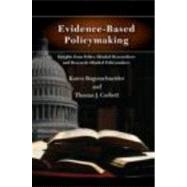
Note: Supplemental materials are not guaranteed with Rental or Used book purchases.
Purchase Benefits
Looking to rent a book? Rent Evidence-Based Policymaking : Insights from Policy-Minded Researchers and Research-Minded Policymakers [ISBN: 9780415805841] for the semester, quarter, and short term or search our site for other textbooks by Bogenschneider; Karen. Renting a textbook can save you up to 90% from the cost of buying.
| Preface | p. ix |
| Foreword | p. xv |
| Exploring the Disconnect Between Research and Policy | p. 1 |
| Reflections on What We Mean by Policy and Evidence-Based Policymaking | p. 3 |
| A Promise Unfulfilled: A Historical Perspective | p. 4 |
| What Went Wrong: Rounding Up the "Usual Suspects" | p. 7 |
| What Makes Understanding the Science-Policy Connection So Challenging? | p. 16 |
| Summary | p. 22 |
| Do Policymakers Want Evidence? Insights From Research-Minded Policymakers | p. 25 |
| Why Are Policymakers Interested in Receiving Research From Professionals? | p. 26 |
| What Kinds of Information Are Most Useful to Policymakers? | p. 32 |
| Where Do Policymakers Go to Get Information? | p. 41 |
| How Do Policymakers Like to Get Information? | p. 44 |
| Summary | p. 52 |
| When Researchers Delivered Evidence to Policymakers | p. 55 |
| The Wisconsin Idea | p. 56 |
| Models for Bringing Research to the Policy Process | p. 63 |
| Summary | p. 74 |
| Who Are These Knowledge Producers and Knowledge Consumers Anyway? | p. 75 |
| Evolution of a Theoretical Perspective | p. 76 |
| Stumbling on the Importance of "Culture" to Explain Communication Breakdowns | p. 79 |
| Toward a Multicommunity Theory of Cultural Influences | p. 91 |
| Summary | p. 97 |
| Why Research Is Underutilized in Policymaking: Community Dissonance Theory | p. 99 |
| Exploring the Character of Community Dissonance | p. 100 |
| Various Meanings of Research Use | p. 104 |
| Some Elemental Concepts: Erecting the Building Blocks of a Theory of Community Dissonance | p. 108 |
| Toward a Conceptual Framework for Thinking About Community Dissonance | p. 114 |
| Summary | p. 125 |
| Breaking Through Stereotypes of Policymakers | p. 129 |
| Researchers' Initial Impressions of Policymakers and How They Changed Over Time | p. 130 |
| Unpacking How Policymakers Differ From Each Other and How Knowledge Brokers Can Leverage These Differences to Their Advantage | p. 135 |
| Summary | p. 146 |
| What Knowledge Producers Should Know About the Policymaking Process | p. 149 |
| Prominent Conceptualizations of the Policy Process | p. 150 |
| When Research Meets the Policy Process: Welfare Reform and Science | p. 151 |
| Nine Observations of the Policy Process: Obvious to Insiders, Surprising to Outsiders | p. 153 |
| Summary | p. 171 |
| Barriers to and Rewards of Cross-Cultural Communication | p. 175 |
| Milk for Poor Kids: An Improbable Policy Victory | p. 176 |
| Researchers' Initial Impressions of Barriers to Working With Policymakers | p. 181 |
| The Rewards of Relaying Research to Policymakers | p. 188 |
| Summary | p. 191 |
| Authors' Note | p. 192 |
| Communicating With Policymakers: Insights From Policy-Minded Researchers | p. 193 |
| What Advice Can Researchers Offer About Communicating Research to Policymakers? | p. 194 |
| Summary | p. 222 |
| Authors' Note | p. 226 |
| Approaching Policymakers: Moving Beyond "What" to "How" | p. 227 |
| Differentiating the Advocacy and Education Approaches for Working With Policymakers | p. 228 |
| Advocacy and Education Across the Ages | p. 229 |
| Which Approach Is the Most Effective When Researchers Wade Into the Policy Community? | p. 233 |
| Why Is the Education Approach Effective? | p. 237 |
| Some Prominent Objections to the Education Approach | p. 247 |
| How Can Educators Establish and Maintain a Nonpartisan Reputation? | p. 249 |
| Summary | p. 250 |
| Endnote | p. 252 |
| Generating Evidence on Disseminating Evidence to Policymakers | p. 253 |
| What Is Known and Unknown About Disseminating Research to Policymakers | p. 254 |
| Baby Steps for Evaluating Efforts to Disseminate Evidence to Policymakers | p. 266 |
| The Family Policy Education Theory of Change | p. 268 |
| Summary | p. 286 |
| Where Do We Go From Here? | p. 291 |
| This Book-A Small Step Forward in a Long Journey | p. 292 |
| What Researchers Could Do and Why It Is So Hard | p. 295 |
| Next Steps: Exploring an Action Agenda | p. 298 |
| Summary | p. 309 |
| Appendix: Methodological Notes | p. 313 |
| The Exploratory Researcher Study | p. 316 |
| The Exploratory Policymaker and Policy Administrator Study | p. 319 |
| References | p. 327 |
| Author Index | p. 339 |
| Subject Index | p. 343 |
| Table of Contents provided by Ingram. All Rights Reserved. |
The New copy of this book will include any supplemental materials advertised. Please check the title of the book to determine if it should include any access cards, study guides, lab manuals, CDs, etc.
The Used, Rental and eBook copies of this book are not guaranteed to include any supplemental materials. Typically, only the book itself is included. This is true even if the title states it includes any access cards, study guides, lab manuals, CDs, etc.